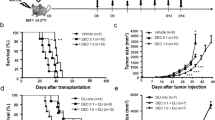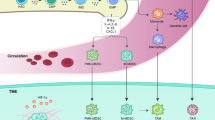Abstract
Purpose
The immunoregulatory effect of demethylating agent decitabine (DAC) has been recognized recently. However, little is known about its impact on immune tolerance. In this study, we aimed to determine the impact of DAC on the immune tolerance induced by tumor cells.
Methods
The effects of DAC on immune cells in vivo were measured by flow cytometry. Myeloid-derived suppressor cells (MDSCs) were sorted using magnetic beads and cultured in vitro. The mixed lymphocyte reaction was used to determine the immunoregulatory effect of DAC in vitro. An adoptive transfusion mouse model was established to evaluate the effect in vivo.
Results
We found that DAC treatment significantly depleted MDSCs in vivo by inducing MDSCs apoptosis. When given at a low dose, the immune effector cells were less affected by the treatment, except for MDSCs. The mixed lymphocyte reaction in vitro showed that T-cell responses were enhanced when MDSCs were depleted. Supplementation of MDSCs would attenuate this T-cell activation effect. Using an adoptive transfusion mouse model, we further demonstrated in vivo that DAC treatment could induce autologous anti-tumor immune response by depleting MDSCs.
Conclusions
This study is the first to illustrate DAC’s immunoregulatory effect on immune tolerance. The disruption of immune tolerance is due to MDSCs depletion that induces an autologous immune response in vivo. By depleting MDSCs, DAC treatment removes one of the obstacles affecting anti-tumor immune activation and warrants further experimental and clinical studies to explore its potential utility in combination with various anti-tumor immunotherapies in the future.




Similar content being viewed by others
Abbreviations
- DAC:
-
Decitabine
- MDSCs:
-
Myeloid-derived suppressor cells
- CTA:
-
Cancer-testis antigens
References
Almstedt M, Blagitko-Dorfs N, Duque-Afonso J, Karbach J, Pfeifer D, Jaeger E, Luebbert M (2010) The DNA demethylating agent 5-aza-2 ‘-deoxycytidine induces expression of NY-ESO-1 and other cancer/testis antigens in myeloid leukemia cells. Leuk Res 34:899–905. doi:10.1016/j.leukres.2010.02.004
Bao L, Dunham K, Lucas K (2011) MAGE-A1, MAGE-A3, and NY-ESO-1 can be upregulated on neuroblastoma cells to facilitate cytotoxic T lymphocyte-mediated tumor cell killing. Cancer Immunol Immunother 60:1299–1307. doi:10.1007/s00262-011-1037-z
Berg T, Guo Y, Abdelkarim M, Fliegauf M, Lubbert M (2007) Reversal of p15/INK4b hypermethylation in AML1/ETO-positive and -negative myeloid leukemia cell lines. Leuk Res 31:497–506. doi:10.1016/j.leukres.2006.08.008
Burke M, Choksawangkarn W, Edwards N, Ostrand-Rosenberg S, Fenselau C (2014) Exosomes from myeloid-derived suppressor cells carry biologically active proteins. J Proteome Res 13:836–843. doi:10.1021/pr400879c
Chan MW, Chang CB, Tung CH, Sun J, Suen JL, Wu SF (2014) Low-dose 5-aza-2′-deoxycytidine pretreatment inhibits experimental autoimmune encephalomyelitis by induction of regulatory T cells. Mol Med 20:248–256. doi:10.2119/molmed.2013.00159
Choi J et al (2010) In vivo administration of hypomethylating agents mitigate graft-versus-host disease without sacrificing graft-versus-leukemia. Blood 116:129–139. doi:10.1182/blood-2009-12-257253
Daurkin I, Eruslanov E, Vieweg J, Kusmartsev S (2010) Generation of antigen-presenting cells from tumor-infiltrated CD11b myeloid cells with DNA demethylating agent 5-aza-2′-deoxycytidine. Cancer Immunol Immunother 59:697–706. doi:10.1007/s00262-009-0786-4
de Haas N, de Koning C, Spilgies L, de Vries IJ, Hato SV (2016) Improving cancer immunotherapy by targeting the STATe of MDSCs. Oncoimmunology 5:e1196312. doi:10.1080/2162402x.2016.1196312
Fan G et al (2005) DNA methylation controls the timing of astrogliogenesis through regulation of JAK-STAT signaling. Development 132:3345–3356. doi:10.1242/dev.01912
Gantt S, Gervassi A, Jaspan H, Horton H (2014) The role of myeloid-derived suppressor cells in immune ontogeny. Front Immunol 5:387. doi:10.3389/fimmu.2014.00387
Hagemann S, Heil O, Lyko F, Brueckner B (2011) Azacytidine and decitabine induce gene-specific and non-random DNA demethylation in human cancer cell lines. PloS One 6:e17388. doi:10.1371/journal.pone.0017388
Highfill SL et al (2010) Bone marrow myeloid-derived suppressor cells (MDSCs) inhibit graft-versus-host disease (GVHD) via an arginase-1-dependent mechanism that is up-regulated by interleukin-13. Blood 116:5738–5747. doi:10.1182/blood-2010-06-287839
Huang B et al (2006) Gr-1 + CD115 + immature myeloid suppressor cells mediate the development of tumor-induced T regulatory cells and T-cell anergy in tumor-bearing host. Cancer Res 66:1123–1131. doi:10.1158/0008-5472.can-05-1299
Jing Y et al (2016) Decitabine-based chemotherapy followed by haploidentical lymphocyte infusion improves the effectiveness in elderly patients with acute myeloid leukemia. Oncotarget. doi:10.18632/oncotarget.11183
Ko HJ, Kim YJ (2016) Signal transducer and activator of transcription proteins: regulators of myeloid-derived suppressor cell-mediated immunosuppression in cancer. Arch Pharm Res. doi:10.1007/s12272-016-0822-9
Konkankit VV et al. (2011) Decitabine immunosensitizes human gliomas to NY-ESO-1 specific T lymphocyte targeting through the Fas/Fas ligand pathway. J Transl Med 9:192. doi:10.1186/1479-5876-9-192
Li X, Mei Q, Nie J, Fu X, Han W (2015) Decitabine: a promising epi-immunotherapeutic agent in solid tumors. Expert Rev Clin Immunol 11:363–375. doi:10.1586/1744666x.2015.1002397
Lucarini V et al (2016) Combining Type I Interferons and 5-Aza-2′-Deoxycitidine to improve anti-tumor response against melanoma. J Invest Dermatol. doi:10.1016/j.jid.2016.08.024
Marvel D, Gabrilovich DI (2015) Myeloid-derived suppressor cells in the tumor microenvironment: expect the unexpected. J Clin Invest 125:3356–3364. doi:10.1172/jci80005
Navada SC, Steinmann J, Lübbert M, Silverman LR (2014) Clinical development of demethylating agents in hematology. J Clin Invest 124:40–46. doi:10.1172/jci69739
Ostrand-Rosenberg S (2016) Tolerance and immune suppression in the tumor microenvironment. Cell Immunol 299:23–29. doi:10.1016/j.cellimm.2015.09.011
Paschall AV et al. (2015) IFN regulatory factor 8 represses GM-CSF expression in T cells to affect myeloid cell lineage differentiation. J Immunol (Baltimore, Md: 1950) 194:2369–2379 doi:10.4049/jimmunol.1402412
Quesnel B et al (1998) Methylation of the p15(INK4b) gene in myelodysplastic syndromes is frequent and acquired during disease progression. Blood 91:2985–2990
Rivard GE, Momparler RL, Demers J, Benoit P, Raymond R, Lin K, Momparler LF (1981) Phase I study on 5-aza-2′-deoxycytidine in children with acute leukemia. Leuk Res 5:453–462
Serafini P (2013) Myeloid derived suppressor cells in physiological and pathological conditions: the good, the bad, and the ugly. Immunol Res 57:172–184. doi:10.1007/s12026-013-8455-2
Serafini P, Mgebroff S, Noonan K, Borrello I (2008) Myeloid-derived suppressor cells promote cross-tolerance in B-cell lymphoma by expanding regulatory T cells. Cancer Res 68:5439–5449. doi:10.1158/0008-5472.can-07-6621
Serrano A, Tanzarella S, Lionello I, Mendez R, Traversari C, Ruiz-Cabello F, Garrido F (2001) Rexpression of HLA class I antigens and restoration of antigen-specific CTL response in melanoma cells following 5-aza-2′-deoxycytidine treatment. Int J Cancer 94:243–251
Singer BD et al (2015) Regulatory T cell DNA methyltransferase inhibition accelerates resolution of lung inflammation. Am J Respir Cell Mol Biol 52:641–652. doi:10.1165/rcmb.2014-0327OC
Solito S, Marigo I, Pinton L, Damuzzo V, Mandruzzato S, Bronte V (2014) Myeloid-derived suppressor cell heterogeneity in human cancers. Ann N Y Acad Sci 1319:47–65. doi:10.1111/nyas.12469
Terracina KP, Graham LJ, Payne KK, Manjili MH, Baek A, Damle SR, Bear HD (2016) DNA methyltransferase inhibition increases efficacy of adoptive cellular immunotherapy of murine breast cancer. Cancer Immunol Immunother 65:1061–1073. doi:10.1007/s00262-016-1868-8
Waight JD et al (2013) Myeloid-derived suppressor cell development is regulated by a STAT/IRF-8 axis. J Clin Invest 123:4464–4478. doi:10.1172/jci68189
Wang LX et al (2013) Low dose decitabine treatment induces CD80 expression in cancer cells and stimulates tumor specific cytotoxic T lymphocyte responses. PloS One 8:e62924. doi:10.1371/journal.pone.0062924
Wang L, Amoozgar Z, Huang J, Saleh MH, Xing D, Orsulic S, Goldberg MS (2015) Decitabine enhances lymphocyte migration and function and synergizes with CTLA-4 Blockade in a murine ovarian cancer model. Cancer Immunol Res 3:1030–1041. doi:10.1158/2326-6066.cir-15-0073
Xiong H et al. (2009) Inhibition of DNA methyltransferase induces G2 cell cycle arrest and apoptosis in human colorectal cancer cells via inhibition of JAK2/STAT3/STAT5 signalling. J Cell Mol Med 13:3668–3679. doi:10.1111/j.1582-4934.2009.00661.x
Yan WH, Lin AF, Chang CC, Ferrone S (2005) Induction of HLA-G expression in a melanoma cell line OCM-1A following the treatment with 5-aza-2′-deoxycytidine. Cell Res 15:523–531. doi:10.1038/sj.cr.7290376
Yan M et al. (2011) Increased PRAME antigen-specific killing of malignant cell lines by low avidity CTL clones, following treatment with 5-Aza-2′-Deoxycytidine. Cancer Immunol Immunother. 60:1243–1255. doi:10.1007/s00262-011-1024-4
Yang H et al (2014) Expression of PD-L1, PD-L2, PD-1 and CTLA4 in myelodysplastic syndromes is enhanced by treatment with hypomethylating agents. Leukemia 28:1280–1288. doi:10.1038/leu.2013.355
Yao Y et al (2013) Increased PRAME-specific CTL killing of acute myeloid leukemia cells by either a novel histone deacetylase inhibitor chidamide alone or combined treatment with decitabine. PloS One 8:e70522. doi:10.1371/journal.pone.0070522
Zhou JH et al (2013) Demethylating agent decitabine induces autologous cancer testis antigen specific cytotoxic T lymphocytes in vivo. Chin Med J 126:4552–4556
Acknowledgements
This work was supported by the National Natural Science Foundation of China (No. 81600168) and the Basic Research Project of Shenzhen Science and Technology Program (No. JCYJ20160422145031770). We thank Dr. Lixin Wang (Department of Hematology, Navy General Hospital, Beijing, China) and Prof. Li Yu (Department of Hematology, PLA General Hospital, Beijing, China) for helpful discussions and support to this study.
Author information
Authors and Affiliations
Corresponding author
Ethics declarations
Funding
This study was funded by the National Natural Science Foundation of China (Grant No. 81600168) and the Basic Research Project of Shenzhen Science and Technology Program (Grant No. JCYJ20160422145031770).
Conflict of interest
Author Jihao Zhou declares that he has no conflict of interest. Author Yushi Yao declares that he has no conflict of interest. Author Qi Shen declares that she has no conflict of interest. Author Guoqiang Li declares that he has no conflict of interest. Author Lina Hu declares that she has no conflict of interest. Author Xinyou Zhang declares that he has no conflict of interest.
Ethical approval
All applicable international, national, and/or institutional guidelines for the care and use of animals were followed. This article does not contain any studies with human participants performed by any of the authors.
Rights and permissions
About this article
Cite this article
Zhou, J., Yao, Y., Shen, Q. et al. Demethylating agent decitabine disrupts tumor-induced immune tolerance by depleting myeloid-derived suppressor cells. J Cancer Res Clin Oncol 143, 1371–1380 (2017). https://doi.org/10.1007/s00432-017-2394-6
Received:
Accepted:
Published:
Issue Date:
DOI: https://doi.org/10.1007/s00432-017-2394-6




